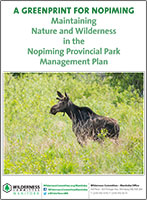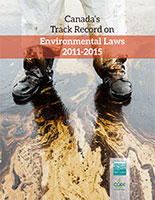
News |
- Banning Paris Climate Marches Bans Public Voice
- Alberta Climate Leadership Plan - Pre Paris
- Protect Nopiming From Mining
- Canada Still Needs To Tackle Climate Change
- New Direction For Canada With Justin Trudeau?
- Hydro's Methane Bomb
- Vote For the Environment
- Manitoba Woodland Caribou Strategy
- Lake Winnipeg Report Still Not Public
- What About First Nations Heritage Plants and Medicines?
- Fracking Bubble Bursting
- B.C. Groups & Eight First Nations Challenge Pipeline
| Banning Paris Climate Marches Bans Public Voice | 27 November 15 |

Major marches planned for COP21 international climate talks in Paris will not be authorised for security reasons, the French government said. Environmental activists - who expected attract hundreds of thousands people on 29 November and 12 December - said that they accepted the decision with regret, but were now considering "new and imaginative" ways of making their voices heard. Civil society organizations and world citizens wished to march in solidarity with Parisians, for peace, and for climate action. The French government's decision reflects very limited values and priorities regarding who and what will get full security protection. Yes to world leaders industry heads and bankers, football matches and Christmas markets; no to climate marches and protests. No matter that the climate negotiations affect billions of lives based on current levels of emission and impacts from climate change. Climate change is a moral crisis of the highest order. Every time governments of wealthy nations fail to act, they say that we, the rich developed nations, are putting our immediate comfort and economic security ahead of the poorest and most vulnerable people on Earth. To ban public protests in the most important and visible spaces where the voices of those affected by climate change would be heard is a dramatic expression of this ethic abuse of power. Silencing the voices of those whose voices matter most including those impacted the most by climate change - is in itself a display of violence. It is a form of cultural violence used by the rich and powerful to maintain the security of the rich and powerful. It keeps the decision makers isolated and out of touch from the reality faced by the billions who are directly affected by climate change.
View November 20, 2015 The Guardian article |
|
 Print version Print version |
Top |
| Alberta Climate Leadership Plan - Pre Paris | 27 November 15 |

"This is the day that we start to mobilize capital and resources to create green jobs, green energy, green infrastructure and a strong, environmentally responsible, sustainable and visionary Alberta energy industry with a great future," Premier Rachel Notley said. "This is the day we stop denying there is an issue, and this is the day we do our part." "This is the day that we start to mobilize capital and resources to create green jobs, green energy, green infrastructure and a strong, environmentally responsible, sustainable and visionary Alberta energy industry with a great future," Premier Rachel Notley said. "This is the day we stop denying there is an issue, and this is the day we do our part." Alberta will cap oil-sands emissions that will phase out coal power plants and implement an economy-wide price for carbon in an effort to curb pollution from Canada’s largest greenhouse-gas emitter. The oil-sands industry will face a limit of 100 megatons of carbon emissions a year, above current annual emissions of about 70 megatons. The province will phase out coal power plants by 2030 and set a carbon price of C$20 ($15) a metric ton by 2017, rising to C$30 in 2018.
View November 25, 2015 Huffington Post article |
|
 Print version Print version |
Top |
| Protect Nopiming From Mining | 30 October 15 |

In October 2015, the Manitoba government released its Draft Management Plan for Nopiming Provincial Park, and there was some good news. The province is looking at expanding protected areas in the park, safeguarding moose and woodland caribou, and better protecting rivers. However, these are things you would expect to happen. Nothing new really. The biggest threat to Nopiming is mining activity. You can read more about mining in Manitoba parks in the Wilderness Committee report. Mining is destructive and has no place in a park. The Manitoba government still has not acted on what it said it would do. Military exercises should not be conducted in the park, yet the southern region of the park definitely shows impacts of military activity, on virtually every lake shore. The Manitoba government has stated they will make these exercises less of an impact on the park, yet again they have not acted. The time for words is long past. When will the Manitoba government make good on all of their promises for parks and protected areas.
Watch October 21, 2015 CBC News video |
|
 Print version Print version |
Top |
| Canada Still Needs To Tackle Climate Change | 24 October 15 |

The Liberal party promises to establish new, credible reviews for proposed development that are comprehensive, consider full and cumulative impacts, including upstream impacts like development in the oil sands, as well as greenhouse gas emissions. The question is what happens to the various energy projects currently under review in hearings across Canada. Justin Trudeau promised to attend climate negotiations in Paris – COP 21 - with all of the provincial premiers and to work with the provinces on emissions reduction plans. The Liberals have also promised to work with other countries like Mexico and the U.S. in developing shared clean energy plans. Climate Action is needed now and the time for action was ten years ago. Canada will test Justin Trudeau and the Liberal party’s commitment and resolve to honour all of their promises.
View Liberal Party Election Platform |
|
 Print version Print version |
Top |
| New Direction For Canada With Justin Trudeau? | 24 October 15 |

During the campaign, the Liberals released an 88-page plan to boost support for post-secondary students, clean up the environment, and lower the tax burden for middle-class families. He also pledged to run three years of deficits to invest in infrastructure and bolster the economy. Alex Marland, a political scientist at Memorial University in St. John's, said this election was driven by personality politics and the "celebritization" of leaders over more substantive issues. "Despite the campaign's extraordinary length, we heard relatively little about the finer details of political parties' platforms, or about their potential cabinet members or candidates," he said. The Liberal Party’s campaign platform comes with a long list of promises that they should have a relatively easy time turning into legislation with their majority. It might take a while to reverse almost 10 years of economic and regulatory change brought in by the Harper Conservatives. Justin Trudeau will be in the spotlight as Canadians and the world wait to find out if he will make good on his promises.
View Liberal Election Platform |
|
 Print version Print version |
Top |
| Hydro's Methane Bomb | 17 October 15 |

The principal environmental risk of hydroelectric dams is organic material—vegetation, sediment and soil—that flows from rivers into reservoirs and decomposes, emitting methane and carbon dioxide into the water and the air. Recent research identified increased risks from methane emissions. Organic material—vegetation, sediment and soil—flows from rivers into reservoirs and decomposes emitting methane and carbon dioxide into the water and then the air throughout the hydro-electric generation cycle. Studies indicate that where organic material is the highest, hydro-electric dams can actually emit more greenhouse gases than coal-fired power plants. Large dams contain enormous amounts of cement, which during the construction process uses massive amounts of energy that emits greenhouse gas emissions. A 2011 study published in the science journal Science found that the "ability of terrestrial ecosystems to act as carbon sinks," could be one quarter less than previously thought. Clearly, carbon and methane emissions from hydro dams is a concern - particularly with so many mega-dams being constructed around the world. More study is needed to determine full carbon and methane emissions from hydro dams and spillways in order to properly include them in climate change discussions.
View October 6, 2015 EcoWatch article |
|
 Print version Print version |
Top |
| Vote For the Environment | 17 October 15 |

Weakening of the Canadian Environmental Assessment Act means approximately 90 per cent of major industry projects that would have undergone a federal review no longer will, according to the report. West Coast Environmental Law (WCEL) and Quebec Environmental Centre did an analysis of all the policy and laws that have been re-written since the Harper government came to power. Karine Peloffy, director general of the Quebec Environmental Law Centre, said Canada's environmental legislation is intrinsically tied into the fabric of the country's democracy. "Our waters, species, and our very democracy have been put at risk by changes made to our environmental laws since 2011," Peloffy said. "When these legal changes were first brought in, we could only speculate about the impacts they would have on Canadians and the environment. Unfortunately, our analysis indicates that our fears have been borne out on the ground." 'Canadian federal legislative changes over the past four years reveals a systemic dismantling of Canada's environmental laws. Since 2012 the federal Harper government has weakened or repealed many of Canada's oldest and most important environmental laws at industry's request, putting Canada's environment, communities and democracy at risk.' - from the introduction to Canada's Track Record on Environmental Laws 2011-2015 released by WCEL. Manitoba Wildlands will be watching to see reversal of many environment law changes. We all need to consider what new Environment Laws and protection are needed.
View West Coast Environmental Law & Équiterre's Report |
|
 Print version Print version |
Top |
| Manitoba Woodland Caribou Strategy | 17 October 15 |

Boreal caribou were listed as threatened in Manitoba in 2006 under the Endangered Species and Ecosystems Act. To date industry and Manitoba Hydro have not been required to avoid woodland caribou habitat when expanding operations. No fines or charges under the Act for impacts on habitat have occurred since 2006. Wildlife biologists estimate there are 1,500 to 3,100 woodland caribou roaming Manitoba's forests in no fewer than 15 overlapping population clumps known as ranges, scattered across a broad swath of the province from the Churchill River in the northwest to Nopiming Provincial Park in the southeast.
View October 16, 2015 Wilderness Committee article |
|
 Print version Print version |
Top |
| Lake Winnipeg Report Still Not Public | 9 October 15 |

As of October 9, 2015 no one knows the status of the CEC report on Lake Winnipeg Regulation. Exhaustive hearings were held, after a forty year period with no public review and no environmental assessment of regulation of Lake Winnipeg, and Manitobans still do not know the results or recommendations. The results of both Aboriginal Section 35 consultations and the CEC hearings must be in the Minister's hands before a decision about the requested final licence for regulation of Lake Winnipeg can be made. The CEC report is now well past the prescribed timeline in the Environment Act. Manitoba Wildlands, a participant in the hearings, is concerned the Manitoba government may not realize how important this CEC set of recommendations is for the future of the Lake, and the communities around the lake. Many Manitobans are waiting for this CEC report. We expect it to be released very soon.
View Clean Environment Commission Lake Winnipeg Regulation hearings |
|
 Print version Print version |
Top |
| What About First Nations Heritage Plants and Medicines? | 9 October 15 |

"Special trees deserve recognition so they can be protected, especially if they have played an important role in Manitoba history or have unique characteristics," said Minister Nevakshonoff. "This program will help ensure these trees are protected and their histories are shared with locals and visitors alike." If it is so easy to protect trees that have had an important role in the history of Manitoba, lets then protect the plants and medicines the original inhabitants of Manitoba have used for thousands of years? Aboriginal Traditional Knowledge studies have been done in enough communities in Manitoba. It would be easy to identify medicines and plants used by First Nations and recognise quite a few more Heritage Plants. The announcement by Minister Nevakshonoff is profoundly lacking in understanding of the relevance of heritage plants in Manitoba. With so many First Nations in Manitoba it would make better sense to protect First Nation medicines as heritage plants that have truly played an important role in the history of the land. This would reflect a more conscious respect for the land and its inhabitants, some of whom have been here for thousands and thousands of years. At best the announcement by the Manitoba Government and Minister Nevakshonoff is condescending. He needs to commit to protection of traditional medicine plants right away.
View October 1, 2015 Manitoba Government news release |
|
 Print version Print version |
Top |
| Fracking Bubble Bursting | 9 October 15 |

"After expanding by a record 1.7 million barrels a day in 2014, the latest price rout could stop U.S. growth in its tracks," the agency reported. U.S. output of shale oil will fall by almost 400,000 barrels per day in 2016. Crude oil prices have declined more than 50 percent since last year. Fracking companies in places like North Dakota, West Texas, parts of Oklahoma and Kansas have all taken a big hit. Many are filing for bankruptcy protection or going out of business. "There were a large number of new entrants into the fracking business during the last four to five years," said industry analyst James West of Evercore. "These are very small ... they were building out their fleet. And now they're finding there's no work out there, and so they're having to close their doors." Currently, Wales, Scotland, the province of New Brunswick and the states of New York, Ohio, Texas and California among many others have all banned fracking.
View October 6, 2015 EcoWatch article |
|
 Print version Print version |
Top |
| B.C. Groups & Eight First Nations Challenge Pipeline | 9 October 15 |

Eight First Nations, four environmental groups, and one union group are presenting their challenges to the Federal Court of Appeal to underscore why the court should revoke Ottawa's approval of the controversial project. The concerns range from protecting salmon spawning grounds, to First Nations lands rights, to the risks associated with increasing tanker traffic on the B.C. coast. "One oil spill would devastate thousands of years of dependence on the sea," Gitxaala Chief Clifford White said Thursday before proceedings began. Lawyer Cheryl Sharvit told the Federal Court of Appeal in Vancouver that the Nadleh Whut'en and Nak'azdli are not declaring the right to veto resource projects on traditional territories in British Columbia's Central Interior. Sharvit said the bands' asserted authority to govern their lands should have at least been considered by the Crown during consultations on the $7-billion pipeline proposal by Enbridge. "The scale of the potential harm from Northern Gateway in their territory is unprecedented. They have never faced a risk this great, from their perspective, from a single project," Sharvit said. Sharvit said the Crown's refusal to discuss governance rights with the First Nations "does serious damage to the goal of reconciliation and protection of aboriginal rights."
View October 8, 2015 Alternatives Journal article |
|
 Print version Print version |
Top |


 RSS Feeds:
RSS Feeds: